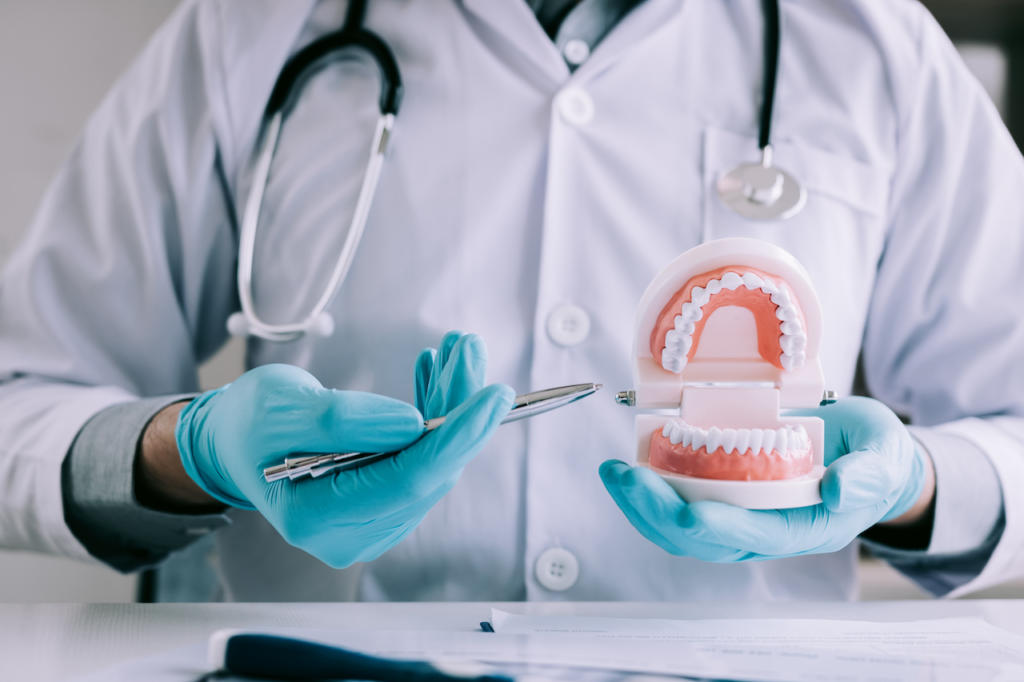
Dental Implants and Cavities: Why Proper Hygiene Matters
Dental implants are artificial devices that a dentist places in a patient’s jawbone. If one or more teeth are lost, an implant may be required. Dentures and dental implants are engineered to endure complex chewing pressures and heavy wear, so they’re designed to be long-lasting. However, people often have several questions related to their dentures. Some of these include:
- Can dentures get cavities?
- Are dental implants vulnerable to decay?
- How should I look after my dental implants?
- What is the average lifespan of dentures?
- Can dental implants get cavities?
This post answers some of these denture and dental implant-related questions.
Can dental implants get cavities?
Patients frequently ask this question because receiving dental implants is a major oral surgery procedure. Cavities build up in natural teeth when plaque, tartar, and bacteria erode the tooth. Dental implants are artificial, despite their natural appearance. Therefore, they’re immune to the harm caused by plaque, tartar, and germs on natural teeth.
What is the average lifespan of dentures?
Irrespective of the material they are made of, the average lifespan of dentures is typically 7-10 years. If your dentures are over 10 years old, have them inspected by your dentist or denturist to ensure they’re functioning well.
Can dentures get cavities?
Dentures cannot develop cavities because they are not formed of the same natural materials as our teeth. Since dentures are made of plastic, acrylic, and metal, they’re resistant to tooth decay. Significant to note, these compounds are not attached to your tissues and are not part of your biological body. If you’re concerned about the potential for oral health problems with dentures, remember that cavities and decay are prevalent in mouth areas related to the roots, which serve as a gateway to the rest of the body.
Why is proper hygiene important for people with dentures or dental implants?
Having good dental health can affect the rest of your body. This is especially true for denture wearers because, with time, dentures become worn, dull, and flattened from use, and the supporting acrylic develops minute cracks. These cause the material to become brittle and harbor bacteria.
Additionally, oral health is related to your overall health. You’ve probably gone to the doctor for a checkup and had a saliva sample collected. They do so because oral health can indicate underlying health issues. Early indications of various systemic diseases can be found in the mouth, including signs and symptoms of cardiovascular disease, diabetes, HIV, and AIDS.
Plaque can build up on the teeth and along the gum line if the mouth is not cleaned regularly and can cause cavities. Eventually, bacteria will collect fast, leading to gingivitis or early gum disease. Without treatment, gingivitis can progress to serious periodontal disease. The infection can spread via the bloodstream to other body parts, increasing the risk of stroke or heart disease. This risk can be mitigated by maintaining adequate dental hygiene.
If cavities are not treated on time, the decay will eventually destroy the teeth, producing large holes that can reach the pulp chamber. Patients may suffer from gum irritation, bad breath, discomfort, and increased sensitivity if the decay reaches the region that houses the nerves and blood vessels of the teeth. To save the natural tooth, root canal treatment may be necessary.

What are the causes of implant decay?
- Infection and bone loss are the most common yet avoidable causes of dental implant decay.
- Peri-implantitis is an infection that develops around and inside the implant. It is frequently caused by poor oral hygiene after a dental implant operation and can result in further bone loss and implant failure. It is important to keep clean hygiene.
- It’s also possible that the implant won’t bond with your natural jawbone. This is common in individuals with minimal jawbone density or those who have experienced dental trauma during the implant operation.
How should I look after my dental implants?
- Brush your teeth at least twice every day, once in the morning and once at night. Keep a toothbrush and toothpaste on hand to clean your teeth after meals while on the road.
- Floss every day. The importance of flossing should not be disregarded. Every day flossing helps eliminate trapped food particles that might cause cavities between teeth.
- Use an antimicrobial mouthwash. This will aid in killing the bacteria and prevent tartar formation.
- Soak and brush your dentures with a soft-bristled brush and gentle denture cleanser to remove food, plaque, and denture adhesive remnants, if any. Soak your dentures overnight in a mild denture cleaning solution or water to maintain their shape.
- Maintain a well-balanced diet. Reduce the quantity of sugary, starchy meals and beverages you eat. You may receive appropriate nutrients and keep your teeth clean by snacking on crunchy fruits and vegetables like carrots or apples.
- Visit your dentist every six months. Your teeth will be appropriately cleaned during these sessions to eliminate any plaque buildup. Your dentist will also take x-rays and conduct a visual examination of the mouth to detect oral health issues before they become serious.
Keep Up Proper Hygiene
The possibility of a dental implant failing might be frightening. Nonetheless, avoiding implant failure is easy. Good oral hygiene is the best method to maintain the health of your dental implants. Use an alcohol-free antimicrobial mouthwash, brush and floss twice a day, and get your dentures checked by your denturist or dentist if you are facing any denture problems.
Looking for affordable and comfortable dentures? At European Denture Center, we offer comfort dentures made with advanced technology and safer dental materials. Our customized dentures are made as per your preferences within your budget. Contact us today for more details.


